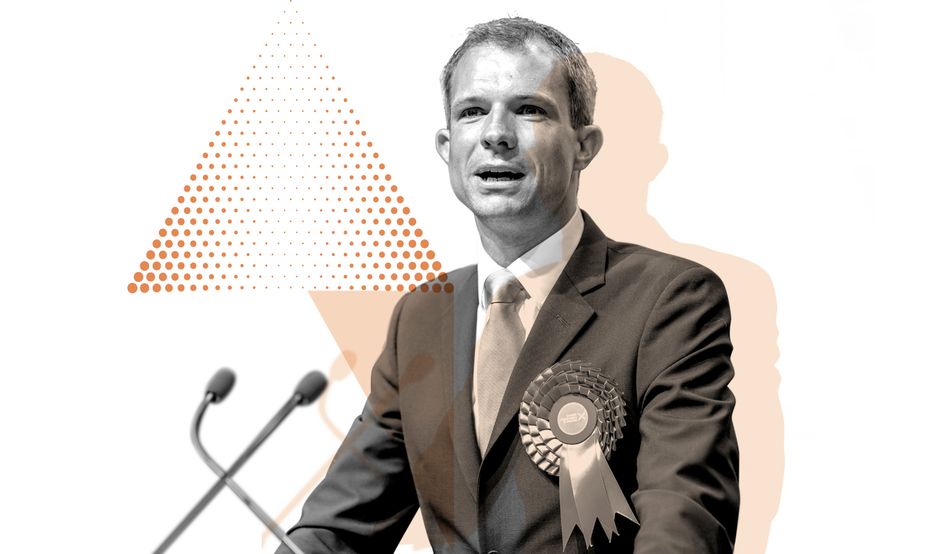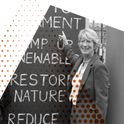It is nearly a year since Andrew Bowie was appointed to Kemi Badenoch’s shadow cabinet. The incoming party leader—juggling just 120 Conservative MPs following the party’s heavy electoral defeat four months earlier—chose to make some of her cohort work hard. Twice as hard in some instances. Bowie was one of those given a dual role, named both shadow secretary of state for Scotland and shadow minister for energy security. It’s an intriguing combination.
Born on Scotland’s east coast and educated at the University of Aberdeen, the 38-year-old has been MP for West Aberdeenshire and Kincardine since 2017. He is steeped in a region dominated by oil and gas. He even spent a brief period, pre-politics, working for a diving equipment firm called Divex (now JFD), one link in the extensive energy supply chain. “You’re constantly aware of the presence of the industry,” Bowie explains over a video call during the summer recess, his open-necked shirt a reflection of parliamentary downtime. “My constituents rely on it for their employment—either directly or indirectly—and it is the key driver of every aspect of the economy.” Given his closeness to the oil and gas sector, there’s a danger that he might become an unyielding advocate for its needs and those of the large petrochemical companies that operate in the region. Is he prepared, as the wider economy transitions away from carbon, to challenge the established view on Scotland’s east coast?
Bowie queries the premise of the question, insisting that the oil and gas industry is “leading the charge” in the shift to greener energy. “So many of the technologies that they’re developing, especially downstream and across the supply chain, are the very technologies that are going to be utilised by emerging energy,“ he says. “For example, today’s pipe-laying vessels are the same vessels that will be used to help deliver offshore wind farms.”
We believe in decarbonisation. We just don’t believe in setting arbitrary targets without any plan to reach them in a sensible way
The MP insists that the big players—he references Total, BP and Shell—are far from “anti-renewables”, boasting instead “a huge footprint” in clean energy. “They want to see both doing well,” he says, claiming that drilling and decarbonisation are far from incompatible. “We’ve continued to drill in the North Sea for the last ten, twenty, thirty years … and we’ve halved our emissions since 1992.”
Bowie believes the negativity comes not from the industry but from Whitehall’s attitude towards it. He cites the energy profits levy—a windfall tax on oil and gas companies operating in the UK and on the UK continental shelf—as an example of a hostile policy that, in turn, encourages market hesitancy. “If you’re a boardroom in Paris or Houston or Abu Dhabi, you’re not going to look at the North Sea as investible right now,” Bowie says.
If he has a criticism of established organisations it’s that they have “run away from actually explaining to people what they do”. By rebranding—from Statoil to Equinor, or from Oil and Gas UK to Offshore Energies UK, for example—they have obscured their underlying fossil fuel operations, which are coming under threat.
The disagreement we have with Labour is over the future role of the UK’s oil and gas industry
In his criticisms of the government’s energy policy Bowie has an unlikely bedfellow in Sharon Graham, the general secretary of Unite. Graham has questioned the idea of retiring skilled oil and gas jobs before equivalent roles are in place in the renewables sector. “You can’t let go of one rope before you’ve grabbed onto another,” she told the New Statesman earlier this year. In a similar vein, Bowie says he remains sceptical, not of renewables per se, but of our ability to store them at scale. This is another gap that needs closing, another rope that needs to be grabbed.
Acknowledging that 2024 was the first year in industrial history when more than half of UK energy production came from renewables, Bowie says that the UK has an “intermittency problem” nevertheless. He reaches for the German word dunkelflaute (translation: dark doldrums) that usefully describes the twin challenge of overcast, windless conditions. In a climate such as the UK’s that has dunkelflaute days on a semi-regular basis, inadequate grid storage is a major challenge.
This leads us to Bowie’s criticism of net zero, the mid-century goal to reduce carbon emissions to as close to zero as possible while absorbing the small amount that remains in the atmosphere. Earlier this year, Badenoch said the UK’s 2050 target was “impossible” to meet. “She said it was impossible without making this country poorer,” restates Bowie. “We can obviously make the decision to go net zero by 2050. The technology is there but, we think, it costs far too much for the country to bear… We believe in decarbonisation. We just don’t believe in setting arbitrary targets without any plan to reach them in a sensible way.”
Among those targets, Bowie cites Clean Power 2030, the government’s aspiration to green the electricity grid within the next five years. He describes it as “absurd”. Why? Because, he says, the UK will not hit the target and will spend money on expensive technologies in a futile attempt to do so when emerging solutions—tidal, for example—are on the cusp of commercial viability and will provide a cheaper path forward if we bide our time.
In an interesting twist, Bowie was parliamentary private secretary to Theresa May in the final months of her premiership. It was during this time, in June 2019, that May’s government passed a net zero target into law, becoming the world’s first major economy to do so. Bowie, a net zero sceptic, recalls that May was very “passionate about the need for Britain to be leading the charge” on decarbonisation. He remembers, too, that it was a time of youth protests, when the Fridays for Future movement animated much of the public debate on climate change.
The current energy secretary, Ed Miliband, describes May’s law—perhaps, in part, for political point-scoring—as “one of the great strides forward” towards sustainability. Miliband accuses Bowie and his colleagues of “trashing” that legacy. Bowie clearly disagrees, arguing that his party is taking a clear-eyed approach to net zero. He notes that, of the two voices from the Conservative benches to speak out as the 2019 net zero bill was debated in the Commons, one was Badenoch. She welcomed the intent but questioned the plan and its affordability. Bowie says his leader’s intervention earlier this year is a continuation of the same critique.
Miliband is passionate, he’s committed, he is driven... [but] I think he’s lost all sense of proportion
In the last 12 months or so, Bowie has identified a greater willingness among the public to push back against the sustainability agenda. Specifically, more communities have taken a stand against building renewable infrastructure, notably wind turbines and solar farms. Across Aberdeenshire, the Highlands and Borders of Scotland, into East Anglia, South Yorkshire and Oxfordshire, local populations—some might describe them as Nimbys—have “reached saturation point”, he says. They feel they are “shouldering a burden” for the rest of the country, creating an “imposition on their landscape and house prices. And yet their energy bills are still as high as anywhere else.”
One high-profile opponent of the turbine is Donald Trump. During a summer visit to his Scottish golf course, the US president told reporters: “When we go to Aberdeen, you’ll see some of the ugliest windmills you’ve ever seen, the height of a 50-storey building.” Bowie says Trump was referring specifically to a group of offshore turbines that are “very visible” from his golf course. Asked if he shares the president’s distaste, Bowie says: “Offshore wind certainly has a role to play, but I’m not a fan of onshore.”
Offshore wind certainly has a role to play, but I’m not a fan of onshore
Aside from the aesthetic—they “blight the landscape”—Bowie says that onshore turbines can impact future uses of the land, affect nature and, “from a purely constituency MP’s point of view”, lower house prices. Offshore, meanwhile, though he worries that it can create a “spatial squeeze” on the fishing industry, is broadly fine: “There’s always trade-offs, a balance to be struck”. What concerns him is a lack of a “holistic approach to decarbonisation”. It is something, he concedes, that characterised the previous Conservative government too, not just the current Labour administration.
Nevertheless, Bowie’s hostility towards Labour policy is clear. Since becoming shadow energy security minister, he has warned against “the dangerous eco-zealotry” of Ed Miliband. He used a parliamentary debate earlier this year to accuse Miliband’s department of “wilfully talking down the oil and gas industry with hostile language … while overseeing the deindustrialisation of the United Kingdom through the perpetuated high cost of industry strategy.” His conclusion: “This is not simply managed decline; it is accelerated decline driven by ideology.”
When asked about such rhetoric, Bowie responds with an initially conciliatory tone. “I can’t fault his enthusiasm for his projects, nor his belief in what he thinks is right,” he says of Miliband. “He’s passionate, he’s committed, he is driven, he is a very effective communicator for what he’s trying to do. That can be taken as a good thing or a bad thing.” More of a bad thing, surely, given what Bowie says next: “I think he’s lost all sense of proportion and he’s certainly not pragmatic.” By way of example, he offers simultaneously signing a deal with Norway which will increase gas imports while refusing further domestic exploration in the very same sea from which Norway will be extracting gas. Bowie’s verdict? “Miliband sees himself as the net zero secretary, forgetting he’s also the energy security secretary.”
And yet, given Bowie’s earlier stated passion for decarbonisation—if not net zero—perhaps the extremes of the climate debate are overstated, especially among established political parties. “There’s certainly consensus in that we want a more sustainable future … On that there’s no disagreement. How we do it, that’s where the real break in consensus occurs. And the genuine disagreement we have is over the future role of oil and gas, the domestic oil and gas industry in the UK.”
A change in rules on assessing Britain’s greenhouse gas emissions—sanctioned by the energy secretary—has recently paved the way for Rosebank, a new oil field off the coast of Shetland, and Jackdaw, a new gas field off the Aberdeen coast. Production is contentious and both sites have faced legal challenge. Hopeful that they will be built, would Bowie have to thank eco-zealot Miliband for making it happen?
He pauses, and then says: “If and when it happens, then yes. But I would like to see a lifting on the ban on other fuels being developed so we can continue to see the investment in the North Sea … and stop the flight to other energy hubs across the world.”












